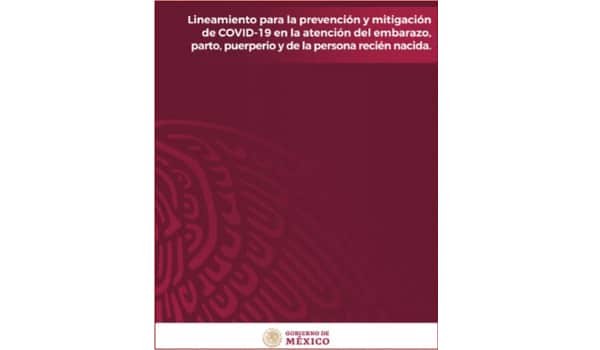
On 10 April 2020, the Ministry of Health of Mexico issued guidelines for maternal healthcare during pregnancy, childbirth and the puerperium as well as newborn care. These services are considered essential and safe abortion care in line with the law is included. These guidelines are focused on care for those with Covid-19 infection, confirmed or suspected. The following is a translation from Spanish of excerpts from the introduction and the section related to safe abortion from the 24-page guidance, which focuses mainly on pregnancy-related care.
The guidelines open by saying that during the Covid-19 pandemic, sexual and reproductive health services, and particularly care during pregnancy, childbirth and the puerperium and for newborns, are classified as essential services and should contribute to the prevention and mitigation of the transmission of Covid-19. The epidemiological and behavioural characteristics of the population, and persistent inequalities in health, translate into differential risks for women of childbearing age and during the reproductive process. It is therefore necessary to intensify efforts to guarantee the continuity and quality of all these services.
Concomitant with coronavirus response strategies, the selection of priorities depends on the local disease burden. Efforts should also be oriented to the prevention of other diseases, including communicable diseases, maternal and neonatal morbidity and mortality, and chronic diseases, which occur in women who are pregnant and of reproductive age. Likewise, the management of obstetric complications and emergencies requires a balance of time and resources to maintain access to care.
According to projections from the National Center for Gender Equity and Reproductive Health, for the period from April to June 2020, there will be an estimated 260,000 obstetric events nationally, including about 235,000 births and about 25,000 abortions. Furthermore, based on previous data, around 1,150,000 antenatal care consultations will take place and 200,000 consultations during the puerperium.
All pregnant women with suspected or confirmed diagnosis of Covid-19, including those in home isolation, should have access to quality services, including obstetric care, neonatal care, safe abortion services (within the framework of the law), post-partum care, contraception, prevention and attention to violence, and psychosocial/mental health support, as required. Likewise, it is essential to guarantee access to clear and truthful information for decision-making within the framework of sexual and reproductive rights.
A temporary reorganisation of services is recommended to allow care of groups of patients with similar conditions. For example, strengthening of primary care clinics in terms of materials, human resources and supplies is a necessary alternative, including:
- Enabling additional physical spaces: health centres, mobile clinics, expanded health centres, community clinics and maternity homes. These will be exclusively for obstetric care in low risk cases with no respiratory symptoms.
- Include obstetric nursing personnel, professional midwives, traditional midwives and GPs with experience in obstetric care.
- Ensure transfer of patients to deal with complications, e.g. to ob-gyn hospital clinics that are not being used for Covid-19 patients and to hospital clinics that are being used for Covid-19 cases for anyone with suspected Covid-19. Provide transportation.
There is no existing evidence that Covid-19 infection increases the risk of abortion in the first or second trimesters. However, 8-12% of normal pregnancies miscarry spontaneously. Hence, comprehensive care for safe abortion also includes the management of complications of miscarriage, e.g. incomplete abortion. According to international evidence, unless there are additional complications, miscarriage can be managed on an outpatient basis with medication.
The implementation of outpatient care allows service provision from the initial consultation in the emergency department, to include treatment for self-administration, accompanied by counselling, checking for indications and signs of risk. If possible, a means of communication, e.g. by telephone, can be arranged to follow patients.
FULL TEXT OF GUIDANCE: Lineamiento para la prevención y mitigación de COVID-19 en la atención del embarazo, parto, puerperio y de la persona recién nacida. Versión 1: 10 de abril de 2020



